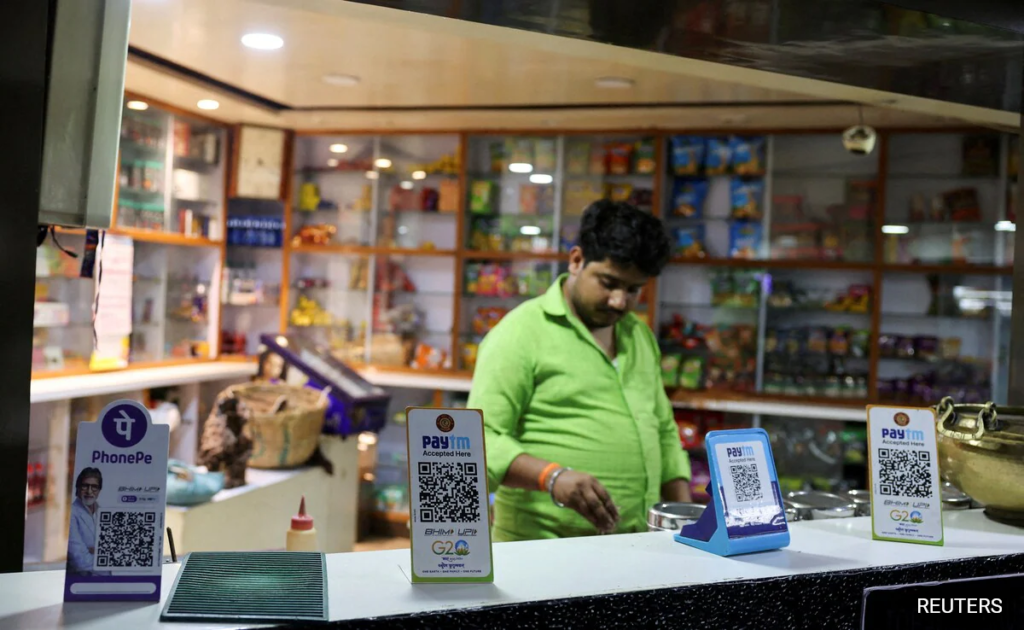India to Postpone Great UPI Payments
In a recent development reported by Reuters, India is set to defer the imposition of market share caps on the Unified Payments Interface (UPI), a popular digital payments method. Citing insider sources, the National Payments Corporation of India (NPCI), acting as a quasi-regulator, will likely extend the deadline by up to two years. This decision, driven by a focus on bolstering growth rather than immediate concerns over market concentration, is poised to benefit major players like Google Pay and PhonePe, a subsidiary of Walmart.

The UPI has emerged as a pivotal force in India’s digital payment landscape, facilitating swift and convenient transactions across various platforms. However, the rapid ascent of certain players has raised questions regarding market dominance and fair competition. Recognizing the need for regulatory measures, the Indian authorities had initially proposed capping the market share of UPI service providers at 30%, aiming to prevent monopolistic tendencies and ensure a level playing field.
PhonePe and Google Pay, two prominent contenders in this space, have experienced divergent trajectories in terms of market share. As per NPCI data, PhonePe’s share of UPI payments surged to 48.3% from 37% within the span of just over a year, underscoring its formidable growth trajectory. In contrast, Google Pay witnessed a decline, with its market share dipping to 37.4% from 44% during the same period. Despite these fluctuations, both platforms collectively processed a staggering 11.5 billion transactions in April, highlighting their substantial footprint in India’s digital economy.
The decision to postpone the implementation of market caps reflects a nuanced approach by Indian regulators, balancing the imperatives of fostering innovation and competition with the need for oversight and regulation. While market concentration remains a legitimate concern, the authorities seem inclined towards nurturing an ecosystem conducive to the continued expansion of digital payments.
One of the key beneficiaries of this delay is PhonePe, which has been on a relentless growth trajectory, rapidly expanding its user base and transaction volumes. Founded in 2015, PhonePe quickly emerged as a frontrunner in India’s digital payments landscape, leveraging its user-friendly interface and innovative features to gain widespread adoption. Backed by Walmart, the company has received substantial investments, enabling it to scale operations and introduce new services.
Similarly, Google Pay, operated by tech giant Google, has been a significant player in India’s digital payment sphere. Leveraging its vast user base and technological prowess, Google Pay initially made significant inroads, capturing a considerable market share. However, intensified competition and regulatory scrutiny have posed challenges, leading to a decline in its market share in recent months.
The decision to delay market share caps is expected to provide a respite for both PhonePe and Google Pay, allowing them to consolidate their positions and explore avenues for further growth. For PhonePe, in particular, this presents an opportunity to capitalize on its momentum and solidify its position as a leading player in the UPI ecosystem. With its focus on innovation and user experience, the company is well-positioned to leverage this extension to drive expansion and deepen its engagement with consumers.
On the other hand, Google Pay can utilize this breathing space to recalibrate its strategy and address the challenges it faces in the Indian market. While the platform continues to enjoy widespread popularity, sustaining growth amidst increasing competition and regulatory pressures necessitates a strategic reevaluation. By leveraging its technological capabilities and global expertise, Google Pay can navigate the evolving landscape and regain lost ground in the UPI segment.
Beyond the immediate implications for PhonePe and Google Pay, the decision to postpone market caps underscores broader trends shaping India’s digital payments ecosystem. As the adoption of digital payments continues to soar, driven by factors such as smartphone penetration, digital literacy, and government initiatives, the landscape is becoming increasingly dynamic and competitive.
In this context, regulatory interventions play a crucial role in shaping the trajectory of the industry, balancing innovation with consumer protection and market stability. By deferring market share caps, Indian regulators signal a commitment to fostering a conducive environment for innovation and competition, while also ensuring adequate oversight and regulation.
However, the decision is not without its critics, who argue that delaying market caps could potentially exacerbate concerns related to market concentration and unfair competition. With certain players enjoying a disproportionate market share, there are apprehensions regarding their ability to stifle competition and dictate terms to consumers and merchants alike.
Moreover, the postponement of market caps raises questions about the efficacy of regulatory interventions in addressing structural issues within the digital payments landscape. While temporary relief may provide breathing space for incumbent players, it does little to address the underlying dynamics driving market concentration and monopoly tendencies.
In light of these concerns, it is imperative for Indian regulators to adopt a proactive approach towards fostering a more competitive and inclusive digital payments ecosystem. This entails not only enforcing existing regulations effectively but also proactively engaging with stakeholders to identify emerging challenges and explore innovative solutions.
Furthermore, there is a need for greater transparency and accountability in the regulatory process, ensuring that decisions are guided by principles of fairness, competition, and consumer welfare. By fostering a culture of openness and dialogue, regulators can build trust among market participants and enhance the legitimacy of regulatory interventions.
Looking ahead, the postponement of market caps presents an opportunity for stakeholders across the digital payments ecosystem to reflect on the broader implications of regulatory interventions and chart a course towards a more vibrant and competitive marketplace. By leveraging this opportunity to drive innovation, enhance transparency, and foster collaboration, India can emerge as a global leader in digital payments, unlocking new opportunities for economic growth and inclusion.

[…] inclusivity, the Boy Scouts of America has announced a significant rebranding effort, set to take effect on February 8, 2025. Under the new name, Scouting America, the organization aims to embrace all […]